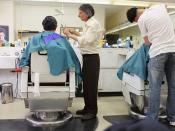Trades and skills, unsurprisingly, are not the most fascinating things of the Middle Ages. This is what I thought when I chose this topic. As I started researching this topic though, I found out that it was one of the more fascinating things of the Middle Ages. For instance, there were some wacky trades like the ale conner. The ale conner was a man who would test beer or ale when it was produced, but he wasn't a chemist. He would take a wooden bench put a small pool of ale on it, and sit on the puddle of ale. After about half an hour, he would stand up. If his britches tore, the ale was low quality, and not fit for a king or noble. The britches would tear because the ale was of poor quality and had too much sugar in it. The high sugar content made the ale bond with the wooden bench and fabric which caused the pants to tear when the ale conner stood up.
Another wacky job was the rat catcher. His job would be relatively unnecessary today, but in the Middle Ages, every village had one. He would go around the village and catch and kill rats. I will explain each of the more interesting or common trades in subgroups that I made.
The first subgroup is food producers. Food producers were the backbone of the Medieval economy, they made everything necessary for the villagers' bare survival. A baker, barkeep, barmaid, brewer, butcher, chef, cook, fisherman, farmer, hunter, pastry cook, taverns keeper, miller, innkeeper, and ale conner are but a few jobs involving getting food from animals or plants to a table. A baker, chef, cook, and pastry cook basically just created food from basic ingredients. A barkeep, barmaid,


